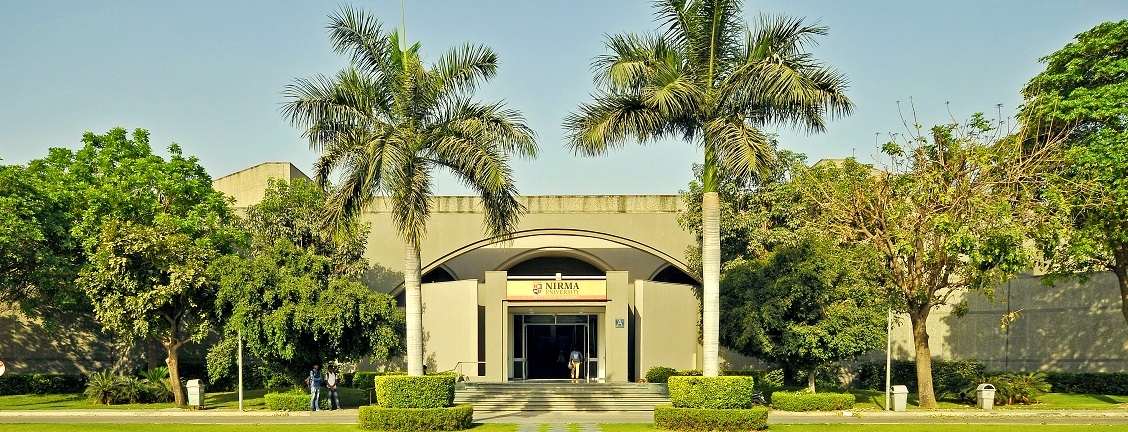
Institute of Technology, established in 1995, is the flagship Institute of the Nirma University.
The Institute is recognised for robust academic programmes, quality teaching-learning process and fostering overall personality development in its students. A blend of young and experienced faculties, committed to teaching and research; have proven to be the best mentors to budding engineers. The Institute offers multidisciplinary undergraduate, postgraduate and doctoral programmes in the discipline of Engineering and Technology. Discipline, ethical and professional work culture, and commitment to providing quality education are the hallmarks that define the Institute.
The Institute of Technology is a constituent institute of Nirma University which is NAAC ‘A+’ grade accredited university in the year 2022 during the third cycle. The institute is ranked between 100 to 150 by the National Institute Ranking Framework (NIRF) making its mark among 4000 plus engineering colleges in the country. The Institute is consistently placed in the first position in GSIRF and consistently placed among the top 5 Institutes in the Western Region and in Top 15 in the country, among self-financed colleges. All the BTech Programmes are accredited by the National Board of Accreditation (NBA) under Tier-I category. All our BTech Programs are NBA accredited since 2020.
The Institute has implemented the National Education Policy 2020 for undergraduate students from the Academic Year 2022-23. The curriculum for undergraduate students is being framed phase-wise for preparing professionals in cutting-edge areas that are fast gaining prominence. Important applications related to health, environment and sustainable living are included in the curriculum for enhancing the employability of the youth.

Meaning in English -“From darkness, lead me to light”
The Motto of the University has been taken from Brihadaranyaka Upanishad – I.III.28. The second line of the Pavamana Mantra explains how to lead the life towards knowledge from ignorance which obscures our mind in understanding the reality. As the only remedy from darkness is light, the only remedy from ignorance is knowledge.
 Vision
VisionInstitute of Technology emphasises the all-round development of its students. It aims at producing not only outstanding professionals, but also good and worthy citizens of a great country, aiding in its overall progress and development.
It endeavours to treat every student as an individual, to recognise their potential and to ensure that they receive the best preparation and training for achieving their career ambitions and life goals.
Student Centricity
Contribution to the Society
Quest for Academic Excellence
Quality Statement
To develop high quality professionals who reflect and demonstrate values that the University stands for, through innovation and continuous improvement in facilitation of learning, research and extension activities

या कुन्देन्दुतुषारहारधवला या शुभ्रवस्त्रावृता
या वीणावरदण्डमण्डितकरा या श्वेतपद्मासना।
या ब्रह्माच्युत शंकरप्रभृतिभिर्देवैः सदा वन्दिता
सा मां पातु सरस्वती भगवती निःशेषजाड्यापहा
Meaning – Salutations to Devi Saraswati, Who is pure white like Jasmine, with the coolness of Moon, brightness of Snow and shine like the garland of Pearls; and Who is covered with pure white garments, Whose hands are adorned with Veena (a stringed musical instrument) and the boon-giving staff; and Who is seated on pure white Lotus, Who is always adored by Lord Brahma, Lord Acyuta (Lord Vishnu), Lord Shankara and other Devas, O Goddess Saraswati, please protect me and remove my ignorance completely.
श्लोक अर्थ – जो विद्या की देवी भगवती सरस्वती कुन्द के फूल, चन्द्रमा, हिमराशि और मोती के हार की तरह धवल वर्ण की हैं और जो श्वेत वस्त्र धारण करती हैं, जिनके हाथ में वीणा-दण्ड शोभायमान है, जिन्होंने श्वेत कमलों पर आसन ग्रहण किया है तथा ब्रह्मा, विष्णु एवं शंकर शङ्कर आदि देवताओं द्वारा जो सदा पूजित हैं, वही सम्पूर्ण जड़ता और अज्ञान को दूर कर देने वाली माँ सरस्वती हमारी रक्षा करें।
Shifting the focus from teaching to learning, Outcome Based Education (OBE) model has been adopted in the Institute of Technology with a firm focus on instruction, curriculum and assessment. The methodology aims at providing a well-articulated learner-centric approach and creating an environment that facilitates self-learning and life-long learning. At present, the Institute offers the following programmes:
Teaching Learning Process
The globalised and changing world and diverse workspace demand shaping the graduates in such manner so that they have critical thinking skills and can pursue multifaceted careers with ease.
Keeping in mind the graduate skill set desired by the industry, the Institute focuses on the teaching-learning process, curricula and evaluation away from lower-order thinking skills, such as remembering and understanding to higher-order skills, such as analysing and problem-solving. Hence, imparting experiential learning with a strong foundation of core courses with an interdisciplinary flavour along with courses aiming to hone thinking skills, such as design thinking and critical thinking forms the basis of the pedagogy followed at the Institute.
Also understanding that the traditional model of education is getting digressed in its path by giving more importance to teaching than learning, we have focussed upon precise learning outcomes and articulating them as Programme Educational Objectives (PEOs) and Programme Outcomes (POs). Adoption of Outcome Based Education was the pivotal decision to make education delivery learner–centric. We understand that students have diverse learning needs. The use of high impact- high attainment methods such as experiential learning which involves experimentation- experience- reflection-conceptualisation in iterative manner; project-based learning for hands down experience and cognitive-learning.
The assurance of Learning is well structured. The well-articulated Graduate attribute (as desired by various stakeholders) and are mapped with Programme Educational Objectives (PEOs) which in turn percolates down to Course Outcome (CO). The tangible outcomes are attained through various indirect and direct assessment (formative and summative) methods.
1. To prepare graduates who will be successful professionals in industry, government, academia, research, entrepreneurial pursuit and consulting firms.
2. To prepare graduates who will contribute to society as broadly educated, expressive, ethical and responsible citizens with proven expertise.
3. To prepare graduates who will achieve peer-recognition; as an individual or in a team; through demonstration of good analytical, design and implementation skills.
4. To prepare graduates who will thrive to pursue life-long learning to fulfill their goals.
1. Engineering knowledge: Apply the knowledge of mathematics, science, engineering fundamentals, and an engineering specialisation to the solution of complex engineering problems.
2. Problem analysis: Identify, formulate, review research literature, and analyse complex engineering problems reaching substantiated conclusions using first principles of mathematics, natural sciences, and engineering sciences.
3. Design/development of solutions: Design solutions for complex engineering problems and design system components or processes that meet the specified needs with appropriate consideration for the public health and safety, and the cultural, societal, and environmental considerations.
4. Conduct investigations of complex problems: Use research-based knowledge and research methods including design of experiments, analysis and interpretation of data, and synthesis of the information to provide valid conclusions.
5. Modern tool usage: Create, select, and apply appropriate techniques, resources, and modern engineering and IT tools including prediction and modeling to complex engineering activities with an understanding of the limitations.
6. The engineer and society: Apply reasoning informed by the contextual knowledge to assess societal, health, safety, legal and cultural issues and the consequent responsibilities relevant to the professional engineering practice.
7. Environment and sustainability: Understand the impact of the professional engineering solutions in societal and environmental contexts, and demonstrate the knowledge of, and need for sustainable development.
8. Ethics: Apply ethical principles and commit to professional ethics and responsibilities and norms of the engineering practice.
9. Individual and team work: Function effectively as an individual, and as a member or leader in diverse teams, and in multidisciplinary settings.
10. Communication: Communicate effectively on complex engineering activities with the engineering community and with society at large, such as, being able to comprehend and write effective reports and design documentation, make effective presentations, and give and receive clear instructions.
11. Project management and finance: Demonstrate knowledge and understanding of the engineering and management principles and apply these to one’s own work, as a member and leader in a team, to manage projects and in multidisciplinary environments.
12. Life-long learning: Recognise the need for, and have the preparation and ability to engage in independent and life-long learning in the broadest context of technological change.